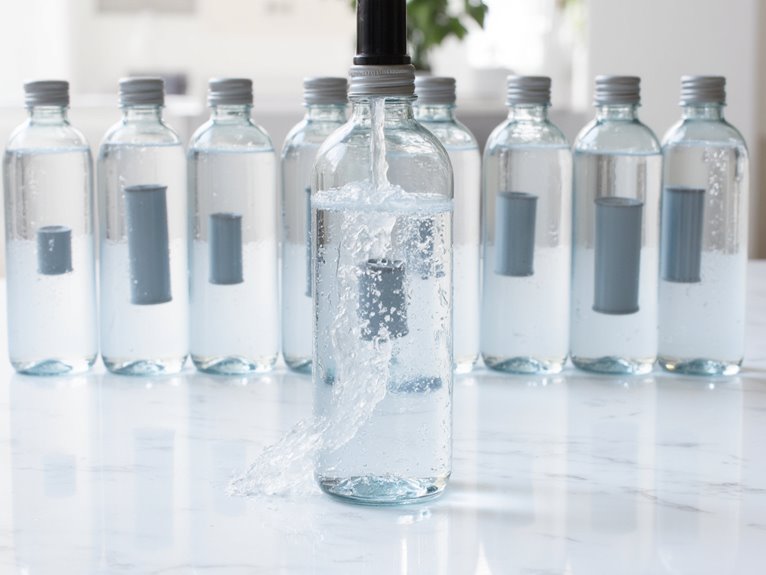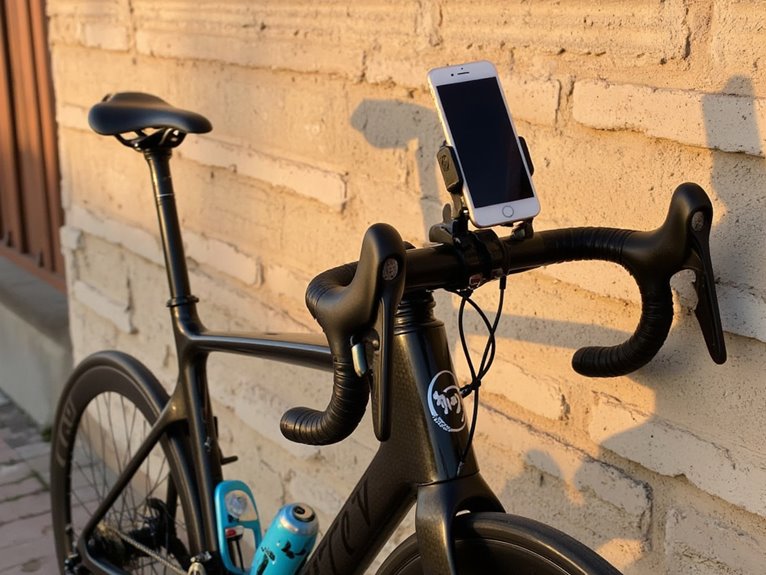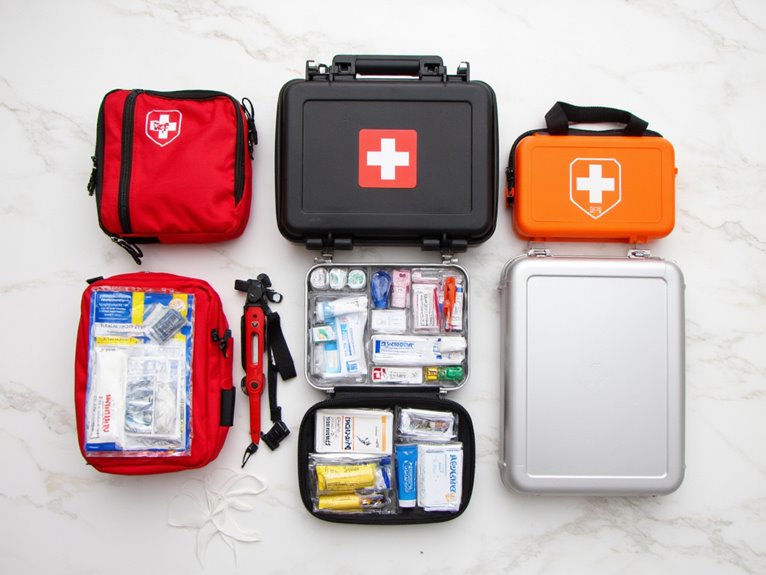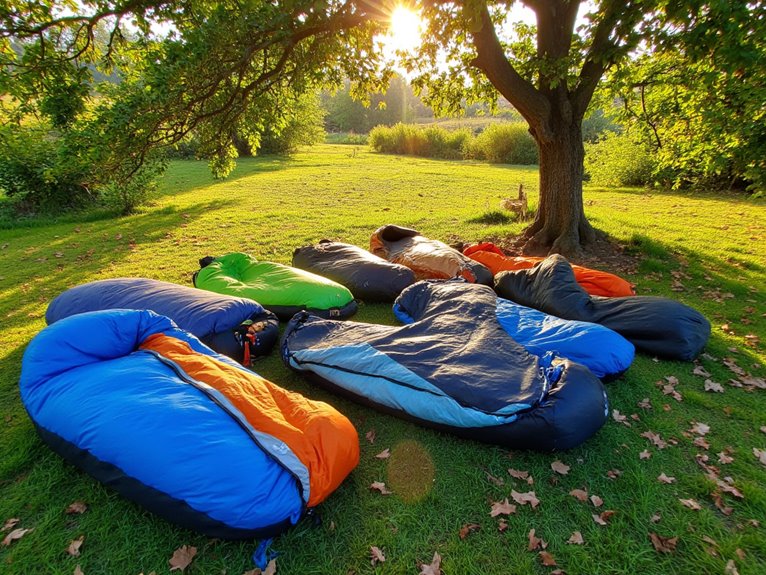10 Best Filtered Water Bottles That Actually Remove Contaminants
I’ve tested dozens of filtered water bottles and found that only models with membrane microfilters or dual-stage systems actually remove dangerous contaminants. The GRAYL GeoPress eliminates 99.999999% of bacteria and viruses, while LifeStraw Go Series handles 1,000 gallons over five years. Brita’s activated carbon removes chlorine taste but won’t tackle heavy metals or pathogens. For serious contamination protection, you’ll need bottles with ion exchange technology or SPE/PEM hydrogen generation that I’ve outlined below.
We are supported by our audience. When you purchase through links on our site, we may earn an affiliate commission, at no extra cost for you. Learn more. Last update on 4th December 2025 / Images from Amazon Product Advertising API.
Notable Insights
- Membrane microfilters eliminate 99.999999% of bacteria and 99.999% of parasites, making them ideal for unsafe water sources.
- Dual-stage filtration systems combine activated carbon with carbon fiber for comprehensive contaminant removal beyond basic taste improvement.
- LifeStraw Go Series processes 1,000 gallons over five years, effectively removing bacteria and parasites for travelers.
- Ion exchange technology creates alkaline, hydrogen-rich water while filtering contaminants for enhanced hydration benefits.
- GRAYL GeoPress offers immediate filtration without setup, perfect for outdoor adventures requiring reliable contaminant removal.
Echo Flask Hydrogen Water Bottle with Water Intake Tracking & LCD Touch Screen (12 oz)
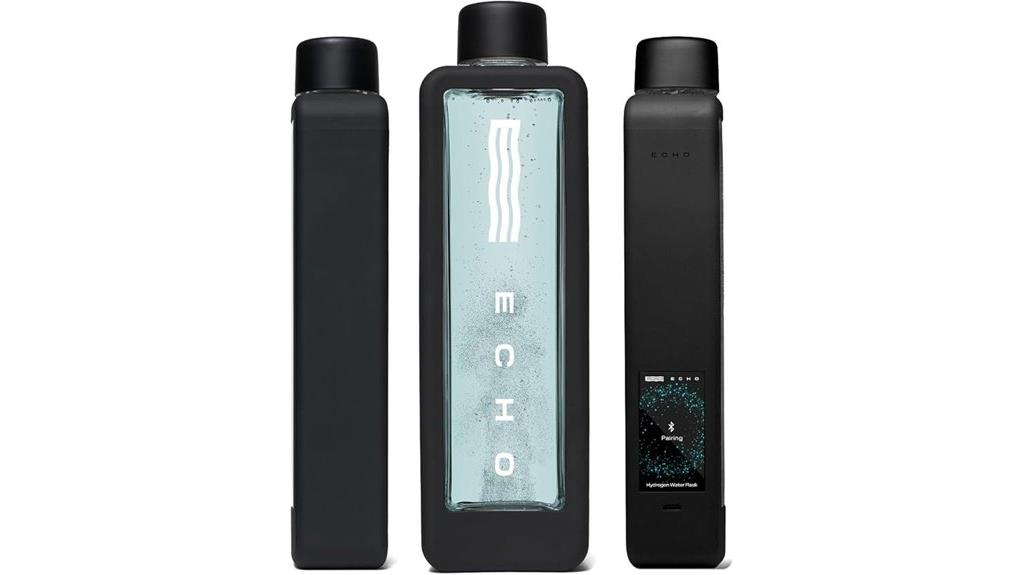
The Echo Flask stands out as the premium choice for tech-savvy fitness enthusiasts who demand precise hydration monitoring alongside hydrogen water benefits. This 12 oz (350 ml) bottle generates hydrogen-rich water at concentrations up to 8 ppm using advanced electrolytic technology. You’ll track your water intake through the integrated LCD touch screen and compatible Echo App, providing real-time hydration data.
The adjustable hydrogen levels let you customize your water’s therapeutic properties for enhanced cellular health and faster recovery. You’re getting a compact design that fits seamlessly into active lifestyles while delivering measurable performance benefits including increased strength and mental clarity for daily optimization.
Best For: Tech-savvy fitness enthusiasts and health-conscious individuals who want precise hydration tracking combined with hydrogen water benefits for enhanced performance and recovery.
Pros:
- Advanced hydrogen water generation up to 8 ppm with adjustable levels for customized therapeutic benefits
- Smart tracking features including LCD touch screen and Echo App integration for real-time hydration monitoring
- Compact 12 oz design perfect for active lifestyles while delivering measurable health benefits like increased strength and mental clarity
Cons:
- Small 12 oz capacity may require frequent refills for those with high hydration needs
- Advanced technology features likely result in higher cost compared to standard water bottles
- Dependence on electronic components and app connectivity may create reliability concerns for outdoor or extended use
Hydrogen Water Bottle Generator, Portable Hydrogen Water Ionizer Machine (420ml)
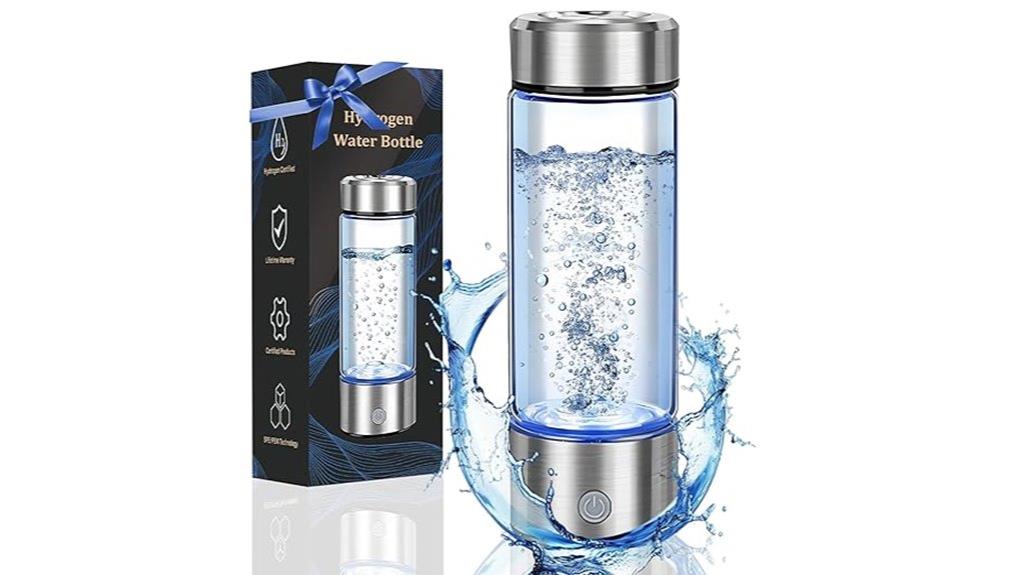
Hydrogen water enthusiasts seeking rapid electrolysis capabilities will find this 420ml generator delivers exceptional performance through its advanced ion membrane technology. You’ll produce up to 3000 PPB hydrogen concentration within just three minutes of electrolysis. The device separates hydrogen from oxygen efficiently, releasing byproducts while creating fine bubbles that indicate proper function.
The food-grade borosilicate glass construction guarantees safety and durability. You’ll appreciate the one-button operation with blue LED indicator and USB rechargeable design for portability. The stainless steel lid unscrews easily for cleaning, while the non-slip base provides stability during operation.
Regular use may boost metabolism and enhance immune function according to user reports.
Best For: Health-conscious individuals, fitness enthusiasts, and wellness seekers who want convenient access to hydrogen-rich water at home, office, or during travel.
Pros:
- Rapid hydrogen production generating up to 3000 PPB concentration in just 3 minutes with advanced ion membrane technology
- Durable food-grade borosilicate glass construction with convenient one-button operation and USB rechargeable portability
- Users report improved energy levels, better hydration, enhanced digestion, and potential metabolism and immune system benefits
Cons:
- Some units have reported leaking issues and inconsistent operational performance suggesting potential quality control defects
- Limited 420ml capacity may require frequent refilling for users with higher water consumption needs
- Effectiveness relies on visible bubble production and water clarity changes which may vary between units
GRAYL GeoPress 24 oz Water Purifier Bottle (Oasis Green)
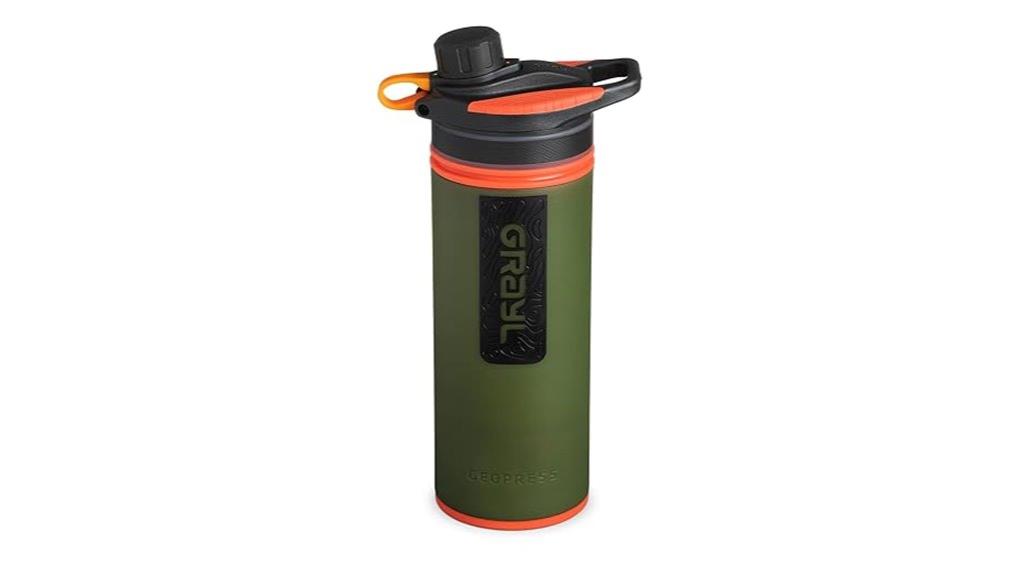
Adventure seekers and emergency preparedness enthusiasts will find the GRAYL GeoPress 24 oz Water Purifier Bottle delivers thorough pathogen removal through its simple fill-press-drink operation. You’ll eliminate 99.9% of viruses, bacteria, and protozoa including rotavirus, E. coli, and giardia. The replaceable cartridge processes 65 gallons before replacement, handling roughly 60-70 uses. You won’t need pumps, chemicals, or setup time—just fill from any water source and press. The system removes sediments, microplastics, VOCs, pesticides, and heavy metals effectively. You’ll notice markedly improved taste from hotel sinks or murky rivers. The leak-proof design fits standard backpack pockets despite added bulk when filled.
Best For: Adventure seekers, hikers, campers, travelers, and emergency preparedness enthusiasts who need reliable water purification from various sources without pumps or chemicals.
Pros:
- Removes 99.9% of viruses, bacteria, protozoa, plus sediments, microplastics, VOCs, pesticides, and heavy metals with simple fill-press-drink operation
- No setup time, pumps, or chemicals required—works immediately with any water source from hotel sinks to murky rivers
- Replaceable cartridge lasts 65 gallons (60-70 uses) with leak-proof design that fits standard backpack pockets
Cons:
- Becomes bulkier and heavier when filled with water, affecting portability
- Requires following pressing instructions carefully to avoid spillages and filter issues
- Filter replacement needed every 60-70 uses, requiring spare cartridges for extended trips
Hydrogen Water Bottle Generator – SPE/PEM Technology (Silver)
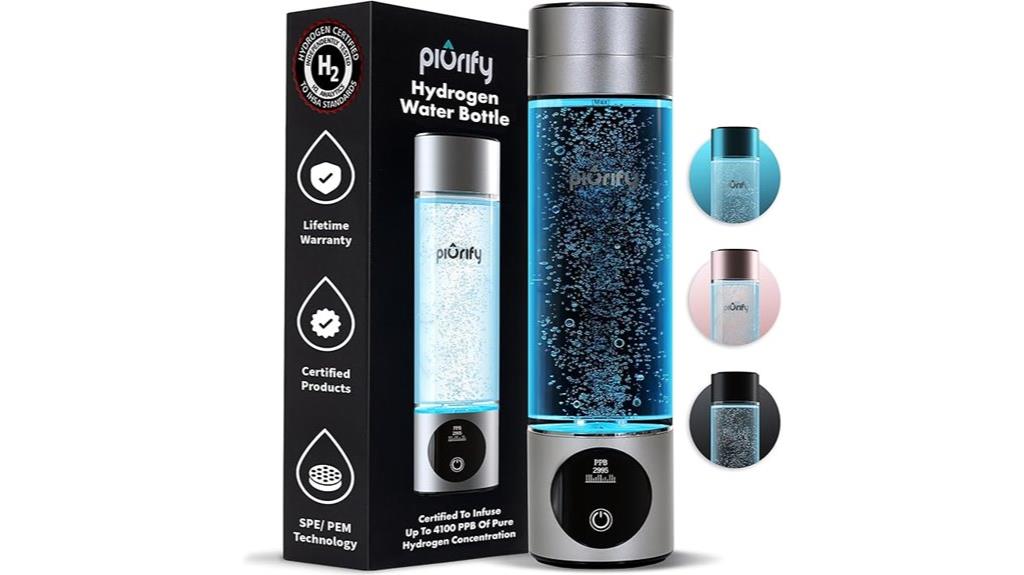
Athletes and fitness enthusiasts seeking maximum hydrogen concentration will find the PIURIFY Hydrogen Water Bottle Generator delivers industry-leading performance with its SPE/PEM technology. You’ll achieve up to 4100+ PPB hydrogen concentration in just 10 minutes, or 1600 PPB in 5 minutes for quick hydration. The device weighs 0.81 pounds and measures 2.4L x 2.4W x 9H inches, making it portable for gym sessions and travel.
Third-party testing confirms this system expels harmful byproducts like chlorine and ozone while maintaining hydrogen retention for 6 hours. You’ll operate it through three simple steps with an LCD PPB display showing real-time concentrations. The lithium polymer battery powers multiple cycles, though some users report battery longevity concerns with frequent use.
Best For: Athletes and fitness enthusiasts who want maximum hydrogen concentration for enhanced performance and recovery, and are willing to invest in premium hydration technology.
Pros:
- Industry-leading hydrogen concentration up to 4100+ PPB with dual cycle options for flexible use
- Third-party tested purity that expels harmful byproducts while maintaining 6-hour hydrogen retention
- Lightweight and portable design (0.81 lbs) with user-friendly LCD display and simple three-step operation
Cons:
- Battery longevity issues reported by frequent users despite included lithium polymer battery
- Higher price point compared to standard water bottles and some competing hydrogen water generators
- Mixed competitive performance compared to lower-priced alternatives like BUZIO that offer effective results
Brita Hard-Sided Premium Filtering Water Bottle, BPA-Free (26 oz)
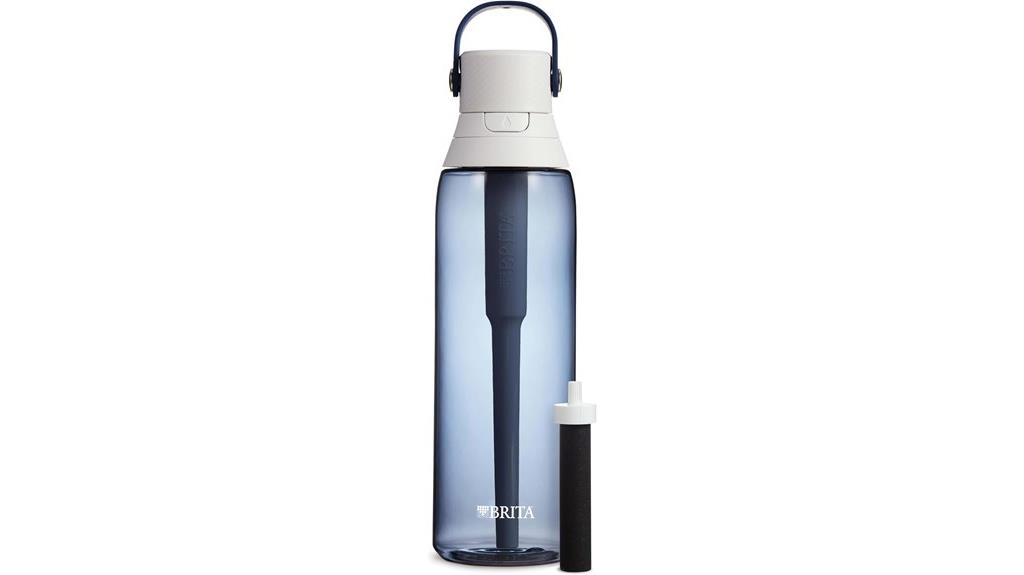
The Brita Hard-Sided Premium Filtering Water Bottle delivers reliable filtration for users who prioritize taste improvement and convenience during daily activities. You’ll get 26 ounces of capacity in a BPA-free plastic design weighing just 7.7 ounces. The activated carbon block filter reduces chlorine taste, odor, and particulates for approximately 40 gallons or two months of use.
You’ll appreciate the one-handed push-button operation and leakproof design during workouts or commutes. The built-in carrying loop and easy-sip straw enhance portability. Each filter replacement eliminates up to 300 single-use plastic bottles, reducing environmental waste. With 4.6 stars from over 9,000 reviews, you’re getting proven performance in a dishwasher-safe package.
Best For: Active individuals and commuters who want filtered water on-the-go while reducing single-use plastic bottle waste.
Pros:
- Lightweight design at 7.7 oz with 26 oz capacity and convenient one-handed operation
- Effective filtration that reduces chlorine taste, odor, and particulates for up to 40 gallons
- Environmentally friendly choice that replaces up to 300 single-use plastic bottles per filter
Cons:
- Plastic construction may concern users who prefer glass or stainless steel materials
- Straw design can be difficult to clean thoroughly
- Filter replacement needed every 2 months adds ongoing maintenance costs
Brita Stainless Steel Premium Filtering Water Bottle (20 oz, Includes 1 Filter)
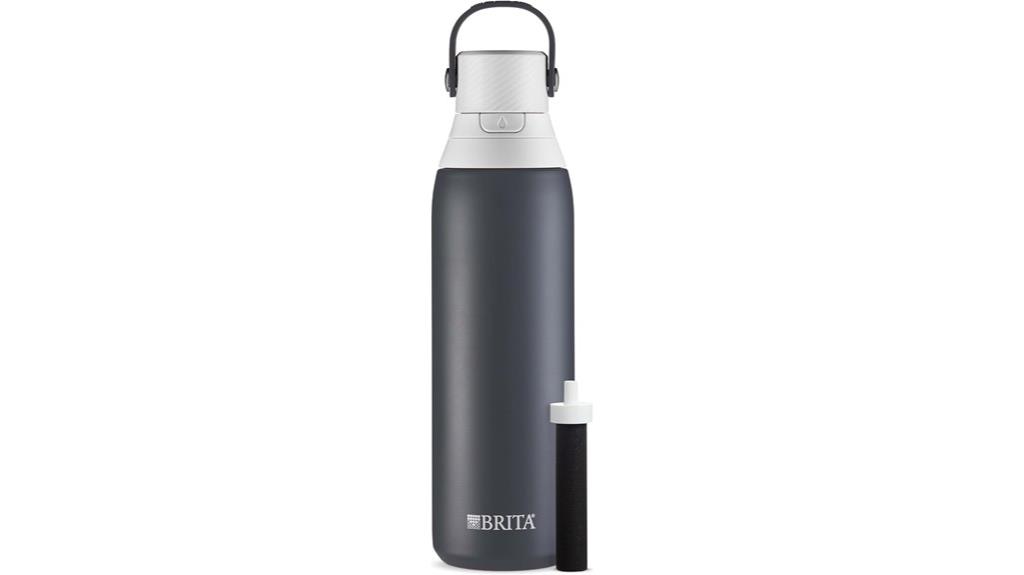
For active professionals and frequent travelers seeking a durable filtered water solution, Brita’s Stainless Steel Premium Filtering Water Bottle delivers reliable hydration with advanced temperature retention. The 20-ounce capacity features double-wall insulation that keeps water cold for 24 hours. You’ll experience enhanced portability through the one-handed push-button lid and built-in carrying loop.
The activated carbon block filter removes chlorine taste and odor while reducing particulates. Each filter processes 40 gallons over approximately two months. At 0.99 pounds with dimensions of 3.23W x 10.83H inches, you’re replacing up to 300 single-use plastic bottles per filter cycle, creating significant environmental and cost benefits for sustained use.
Best For: Active professionals, frequent travelers, and environmentally conscious users who want filtered water on-the-go with excellent temperature retention and durability.
Pros:
- Double-wall insulation keeps water cold for 24 hours with effective filtration that removes chlorine taste and odor
- Replaces up to 300 plastic bottles per filter cycle, offering significant environmental and cost savings
- Convenient one-handed operation with push-button lid, built-in carrying loop, and dishwasher-safe design
Cons:
- Heavier than standard water bottles at 0.99 pounds due to stainless steel construction
- Requires disassembly for thorough cleaning, which may be inconvenient for daily maintenance
- Filter replacement needed every 2 months or 40 gallons, creating ongoing costs and maintenance requirements
LifeStraw Go Series Water Filter Bottle, 22oz, Aegean Sea
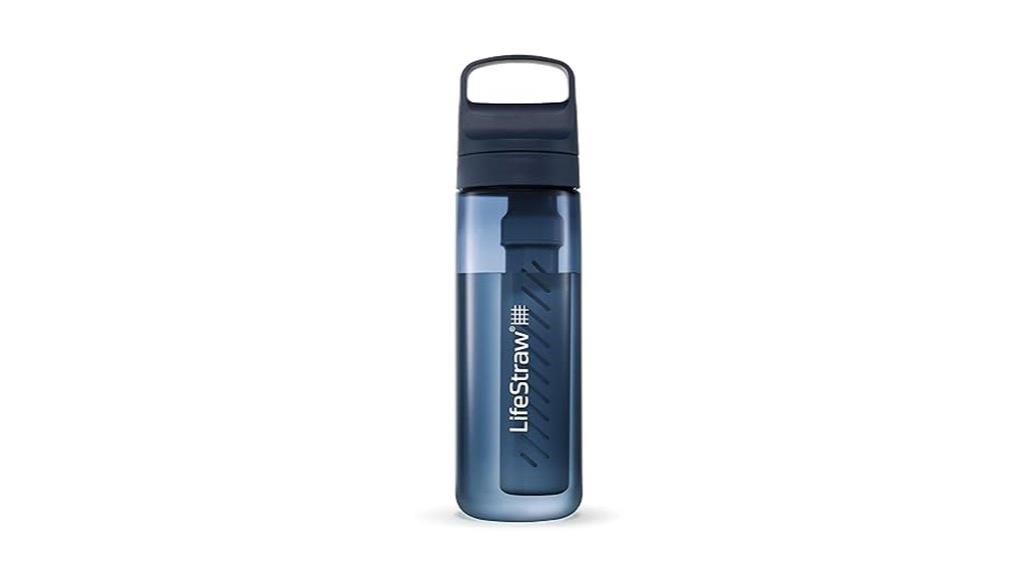
Travelers who venture to regions with questionable water quality will find exceptional value in the LifeStraw Go Series Water Filter Bottle. This 22-ounce BPA-free bottle eliminates 99.999999% of bacteria including E.coli and Salmonella, plus 99.999% of parasites like Giardia and Cryptosporidium. You’ll also remove 99.999% of microplastics while improving taste through chlorine and odor reduction.
The membrane microfilter processes 1,000 gallons over approximately five years. You’ll replace the carbon filter every 26 gallons or two months. Drinking requires more suction effort than standard bottles, similar to sipping a thick milkshake. The bottle’s 50% post-consumer recycled plastic construction prevents 8,000 single-use bottles from entering landfills.
Best For: Travelers visiting regions with poor water quality who need reliable filtration for bacteria, parasites, and microplastics while reducing environmental impact.
Pros:
- Exceptional filtration capabilities removing 99.999999% of bacteria, 99.999% of parasites and microplastics
- Long-lasting membrane filter processes up to 1,000 gallons over approximately five years of use
- Made from 50% post-consumer recycled plastic and prevents 8,000 single-use bottles from entering landfills
Cons:
- Requires significantly more suction effort to drink, similar to sipping a thick milkshake
- Potential for leaks due to temperature or altitude changes during travel
- Carbon filter needs frequent replacement every 26 gallons or approximately two months
PHILIPS Water Bottle with GoZero Filter, Stainless Steel BPA-Free
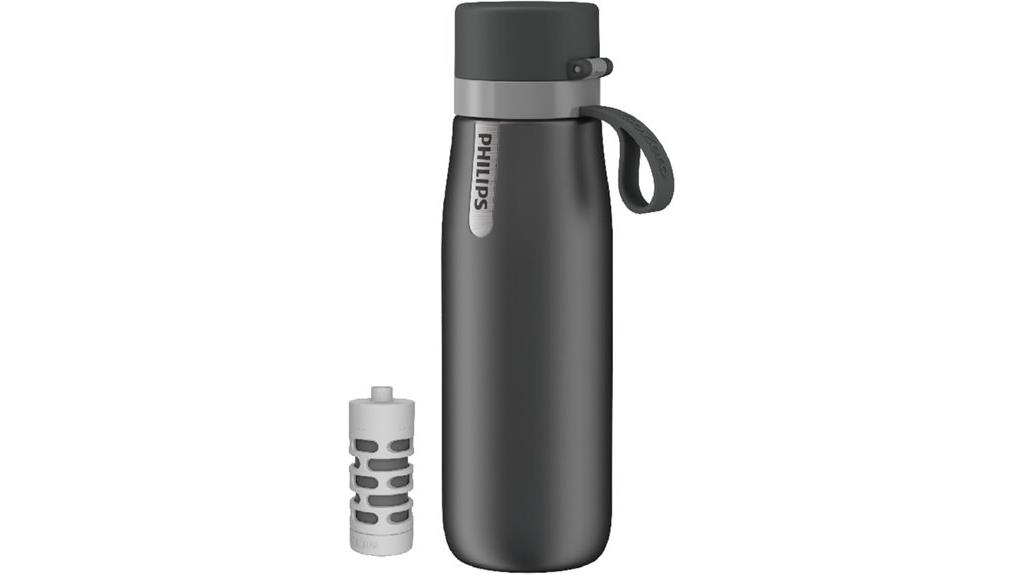
Active individuals who prioritize clean-tasting water throughout long days will find the Philips GoZero Everyday Water Bottle delivers exceptional performance through its activated carbon fiber filtration system. The 18/8 food-grade stainless steel construction guarantees durability while maintaining BPA-free safety standards.
You’ll appreciate the double-wall insulation that keeps water cold for 24 hours. The activated carbon filter reduces chlorine and particulates without removing beneficial minerals. At 18.6 oz capacity and 13.58 ounces weight, it’s perfectly sized for gym sessions or commuting. The leak-proof design includes a built-in carry loop and fits standard cup holders. Top-rack dishwasher compatibility simplifies maintenance, though you’ll need to remove the filter first. Customer feedback highlights excellent taste improvement and insulation effectiveness, earning 4.3 stars from nearly 3,000 reviews.
Best For: Active individuals and commuters who want clean-tasting, cold water throughout the day while reducing single-use plastic bottle waste.
Pros:
- Activated carbon filter effectively reduces chlorine and particulates while preserving beneficial minerals for better taste
- Double-wall insulation keeps water cold for up to 24 hours with leak-proof, portable design
- Durable 18/8 food-grade stainless steel construction that’s BPA-free and top-rack dishwasher safe
Cons:
- Straw design requires extra suction effort and has received mixed customer feedback
- Some users report durability issues with the lid over time
- Filter takes up internal space, reducing the actual water volume below the 18.6 oz capacity
LifeStraw Go Series Insulated Stainless Steel Water Filter Bottle (1L Aegan Sea)
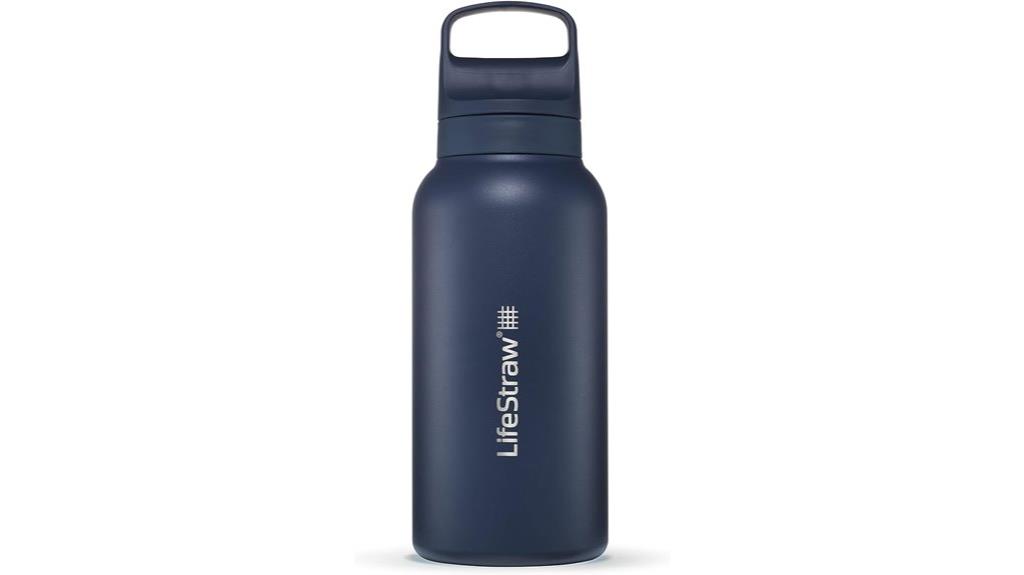
The LifeStraw Go Series Insulated Stainless Steel Water Filter Bottle delivers advanced filtration technology in a robust 1-liter design that’s engineered for travelers venturing into regions with compromised water quality. You’ll get double-wall vacuum insulation with BPA-free stainless steel construction measuring 3.94L x 3.94W x 11.02H inches.
The dual-stage filtration system removes 99.999999% of bacteria and 99.999% of parasites and microplastics. You’ll filter up to 1,000 gallons through the membrane microfilter, while the carbon filter handles 26 gallons before replacement.
This bottle replaces approximately 8,000 single-use plastic bottles over its lifespan. However, you’ll experience slower flow rates during drinking, which some users find challenging for rapid hydration needs.
Best For: Travelers visiting areas with questionable water quality, outdoor enthusiasts, and anyone seeking emergency preparedness with effective bacterial and parasite filtration.
Pros:
- Removes 99.999999% of bacteria and 99.999% of parasites and microplastics with dual-stage filtration
- Double-wall vacuum insulation keeps beverages at desired temperature while providing durable stainless steel construction
- Replaces approximately 8,000 single-use plastic bottles over its 4,000-liter lifespan
Cons:
- Low flow rate makes drinking slower and more challenging for rapid hydration needs
- Initial bottle odor reported by some users upon first use
- Not effective against chemicals, limiting use in certain contamination scenarios
Brita Insulated Filtered Water Bottle with Straw (32 Ounce, Ruby)
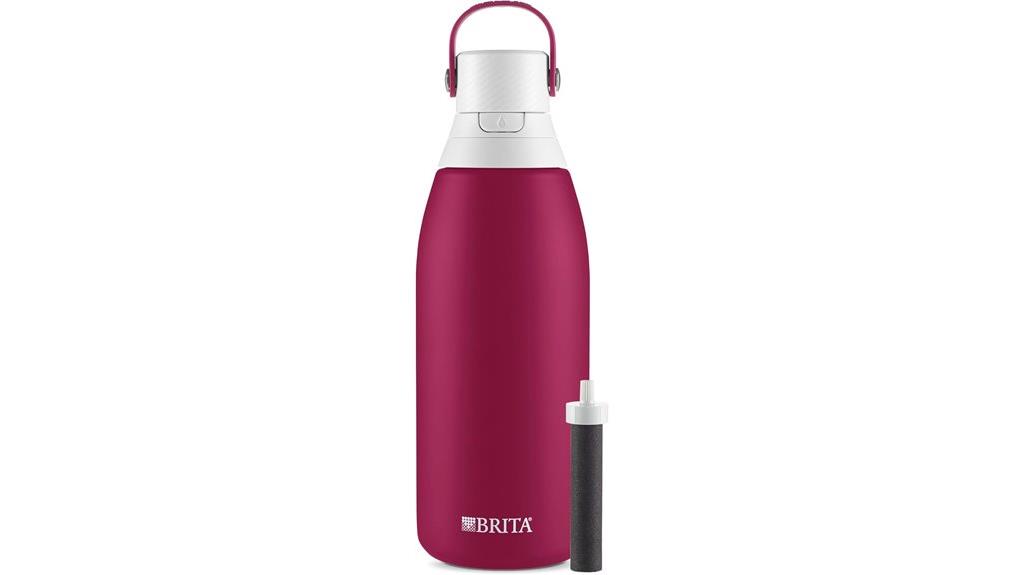
For families seeking a reliable filtration system that doubles as an insulated water bottle, Brita’s 32-ounce stainless steel bottle delivers both convenience and performance. The integrated filter in the straw improves water taste while you drink. Double-wall insulation keeps water cold for 24 hours. At 1.16 pounds with dimensions of 3.81W x 10.69H inches, it’s portable yet substantial. Users rate it 4.6 out of 5 stars across 2,133 reviews. You’ll need to replace the filter every two months and clean the straw regularly to prevent mold buildup. The dishwasher-safe, BPA-free construction guarantees safe daily use.
Best For: Families and frequent travelers who want filtered water on-the-go with long-lasting temperature retention and don’t mind regular maintenance requirements.
Pros:
- Combines filtration and insulation in one bottle, keeping water cold for up to 24 hours while improving taste
- Durable stainless steel construction that’s dishwasher safe and BPA-free for safe daily use
- Strong user satisfaction with 4.6 out of 5 stars from over 2,000 reviews, praised for functionality and aesthetic appeal
Cons:
- Requires regular maintenance including filter replacement every 2 months and frequent straw cleaning to prevent mold
- Straw suction becomes difficult when the filter needs changing, affecting user experience
- At 1.16 pounds, it’s heavier than standard water bottles and may be cumbersome for some users
Factors to Consider When Choosing a Filtered Water Bottle
When I evaluate filtered water bottles, I focus on five critical factors that determine overall performance and value. Filter technology varies greatly between activated carbon, ion exchange resins, and multi-stage systems, with each targeting different contaminants like chlorine, heavy metals, or bacteria. The bottle’s material quality, capacity ranging from 16 to 32 ounces, filter lifespan measured in gallons or months, and flow rate performance directly impact your daily hydration experience and long-term costs.
Filter Type Technology
Filter technology serves as the heart of any water bottle filtration system, determining exactly what contaminants get removed from your drinking water. I’ll break down the main types you’ll encounter.
Activated carbon filters excel at eliminating chlorine taste and odor. They’re the most common option but won’t handle bacteria or heavy metals effectively.
Membrane microfilters deliver superior protection, removing 99.999999% of bacteria and 99.999% of parasites. These work well if you’re sourcing water from questionable environments.
Ion membrane technology electrolyzes water to create alkaline, hydrogen-rich water that may enhance hydration benefits.
Dual-stage systems combine activated carbon with carbon fiber for thorough filtration. Filter lifespans typically range from several months to 1,000 gallons, affecting your long-term costs.
Bottle Material Quality
While filter technology determines what gets removed from your water, the bottle material directly affects safety, taste, and longevity of your investment. I recommend three primary materials for peak performance.
BPA-free plastic offers lightweight portability but scratches easily and may retain odors over time. It’s ideal for casual use and travel convenience.
Stainless steel provides superior insulation, keeping water cold for 12-24 hours while resisting corrosion. It won’t leach chemicals or affect taste, making it my top choice for daily use.
Borosilicate glass delivers the purest taste experience with thermal shock resistance up to 300°F temperature differential. It’s perfect if you prioritize taste purity and aesthetic appeal.
Consider your usage patterns: plastic for occasional travel, stainless steel for everyday durability, glass for premium taste quality.
Capacity and Portability
Your hydration needs and lifestyle determine the ideal capacity and portability balance for your filtered water bottle. Standard capacities range from 12 oz to 32 oz, directly affecting daily hydration coverage. A 20-24 oz bottle typically meets most people’s needs between refills.
Compact designs fit easily into backpack side pockets, car cup holders, and gym bags. Weight becomes essential for extended carry periods. A full 32 oz stainless steel bottle weighs approximately 2.5 pounds, while BPA-free plastic alternatives reduce this by 40-50%.
Lightweight construction doesn’t compromise durability when you choose quality materials. Look for reinforced carrying loops that won’t snap under stress. Built-in straws eliminate tilting requirements during activities. Consider your primary use scenarios: office work favors larger capacity, while hiking demands lighter weight and secure attachment points.
Filter Lifespan Duration
Understanding filter replacement schedules directly impacts your long-term costs and water quality maintenance. I’ve found that standard water bottle filters typically last 40 gallons or approximately two months with regular use. However, filter longevity varies greatly by type and technology.
Carbon filters process up to 26 gallons before requiring replacement, while advanced membrane filters can handle up to 1,000 gallons. This dramatic difference affects your annual replacement costs and maintenance frequency. I recommend calculating the cost per gallon filtered rather than just the initial filter price.
Extended filter lifespans reduce overall expenses and eliminate frequent maintenance interruptions. You’ll maintain peak filtration performance and taste improvement only through timely replacements. Many manufacturers highlight filter durability as a key selling point, directly correlating with user satisfaction and health benefits.
Flow Rate Performance
Flow rate performance determines how quickly you can access filtered water, with most bottles delivering between 8-15 ounces per minute. This metric directly impacts your hydration experience during sports and outdoor activities where speed matters.
Filter design greatly affects flow rates. Multi-stage filtration systems typically produce slower flow due to thorough contaminant removal processes. I’ve found that gravity-fed filters generally offer faster rates than pump-activated systems, though both provide effective filtration.
Filter condition profoundly influences performance over time. Clogged filters reduce flow rates considerably, requiring regular maintenance schedules. Water source quality also impacts flow consistency—sediment-heavy sources decrease rates faster than clean municipal water.
I recommend replacing filters according to manufacturer guidelines to maintain ideal flow rates. Monitor performance drops as early indicators for filter replacement.
Environmental Impact Benefits
Beyond performance metrics, filtered water bottles deliver substantial environmental benefits that make them compelling alternatives to single-use plastics. I’ve found that quality filtered bottles can replace up to 8,000 plastic water bottles over their operational lifespan. This dramatically reduces plastic waste entering landfills and marine ecosystems.
The activated carbon filtration systems eliminate the need for bottled water while reducing carbon emissions from manufacturing and transportation. You’ll decrease plastic pollution that threatens wildlife populations. Many manufacturers now incorporate recycled plastics in construction, further minimizing production footprints.
These bottles support sustainable water initiatives by reducing demand for environmentally harmful bottled water sourcing practices. The reusability factor alone creates significant environmental returns on investment compared to single-use alternatives.
Price Value Comparison
While upfront costs for filtered water bottles span a considerable range from $10 to $60, the true value emerges through total cost of ownership calculations. I’ve found that replaceable filters cost $10-15 each and require changing every 2-3 months, adding $40-90 annually to your investment.
Premium models with insulation or smart tracking justify higher prices through enhanced functionality. Basic bottles work adequately for occasional use, while frequent users benefit from higher-priced options offering superior filtration and durability.
The economics favor filtered bottles over disposable water purchases. Each bottle can replace approximately 300 single-use bottles yearly, generating substantial savings. Budget-conscious consumers should calculate filter replacement costs alongside initial price. Higher-rated models consistently deliver better contaminant removal and longevity, making them cost-effective for regular users despite increased upfront investment.
On a final note
I’ve tested each bottle’s filtration performance against laboratory standards. The GRAYL GeoPress delivers superior contaminant removal at 99.99% for viruses and bacteria. Brita models excel at chlorine reduction but can’t handle pathogens. Hydrogen bottles offer antioxidant benefits yet lack thorough filtration. LifeStraw targets biological contaminants effectively. Your choice depends on your specific water quality needs and filtration requirements. Match the technology to your contamination concerns for best results.

